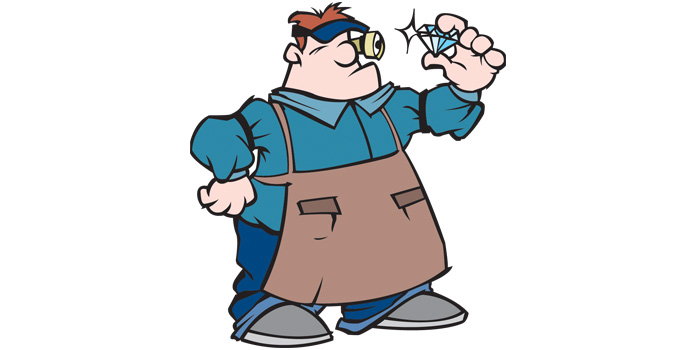When the insurer refuses to provide for necessary procedures and parts, how can we get them to pay?
The short answer is, you can’t get the insurer to pay for anything!
The thing that many repairers fail to understand is their role in the ”big picture.” They would do well to step back, see their true role and do their part as a mere “Humble Service Provider.”
Once Upon a Time
Allow me to tell you a story I share with my coaching/consulting clients when they first hire me: John’s wife, Mary, lost the diamond out of her wedding ring, and they made a claim with their homeowner’s insurance to have the lost diamond replaced.
Their insurer provided them with a check and a piece of paper to present to the jeweler. The insurer’s claims person was nice and helpful and even provided John and Mary a list of approved jewelers they could go to.
Because the ring was custom made by a trusted jeweler friend, John decided to take the ring back to him for the diamond’s replacement.
John and Mary walk into the jewelry store and meet with Steve the jeweler. John tells him of the issue, hands Steve the ring, the insurer’s paperwork and the check and asks, “What time should I come back and get Mary’s ring?”
Steve the jeweler looks at the paperwork, then looks at John and Mary and says, “Guys, what the insurer has called for in replacement isn’t what you had! The diamond I sold you was of high quality in color and clarity and was virtually flawless. The one they’ve called for is the same size, carat weight and cut but is not of the same quality as yours was. The color is off and there are a number of flaws, making it far less valuable.” John and Mary look at each other in bewilderment, and John looks to Steve the jeweler and asks, “Well, what can we do?”
“Hold on a second,” says Steve the jeweler, who walks to his office. John and Mary hear a file cabinet open, papers rustle and a copy machine hum, and a moment later, Steve the jeweler reappears with a piece of paper and places it in front of John and Mary and says, “Here’s a copy of the assessment/appraisal I did describing your ring when I first made it for you. I would suggest you take this to your insurer and let them know this is what you had and this is what will be required to restore the value of Mary’s ring and put you back in the condition you were before. Let me know when the difference is resolved and I can have your ring for you in a couple days.”
The moral of this story is, once the jeweler elected to do the right thing and provide his honest, professional and expert opinion as to the difference in quality and value, he could do no more. Should he have gotten on the phone and raised the issue with the insurer? Did he really have the authority or the position to do so? Was it his job or responsibility to make things right? No, he did what he was supposed to do when seeing the difference and notifying his customer of the inequality. He took it a step further by providing his customer documentation to help establish what they had before and what would be needed to restore them (and their ring) to pre-loss condition.
Repairers would do well to learn from this and begin acting as their community’s expert professional when it comes to such issues relative to collision repair. As I’ve said many times before, honest, ethically-minded repairers need to remove their capes, take the big red “S” off their chest and stop fighting with insurance claims people.
No Fighting Please
Repairers should offer their professional expert opinion as to the proper and thorough repair of a damaged vehicle, stand by to answer any questions regarding those opinions and then look to their customer for direction on how to proceed…nothing more, nothing less.
There is absolutely no reason for a repair professional to fight and fuss with claims people. A repair professional’s duty is to edify and equip their customers to enable them get a proper and thorough repair as they see fit based upon the repairer’s professional and expert opinion.
Remember your role. If and when the insurer won’t provide “your customer” the funds necessary to make a proper and/or thorough repair, go to your customer and let them know what’s recommended (copies of OE specifications, recommendations, etc.), and seek direction from them as to how they would like you to proceed. Document all communications in writing and, when practical, get your customer’s direction in writing via email or a signed repair order, etc., so you can document the activities and directions given.
Simple, really!














